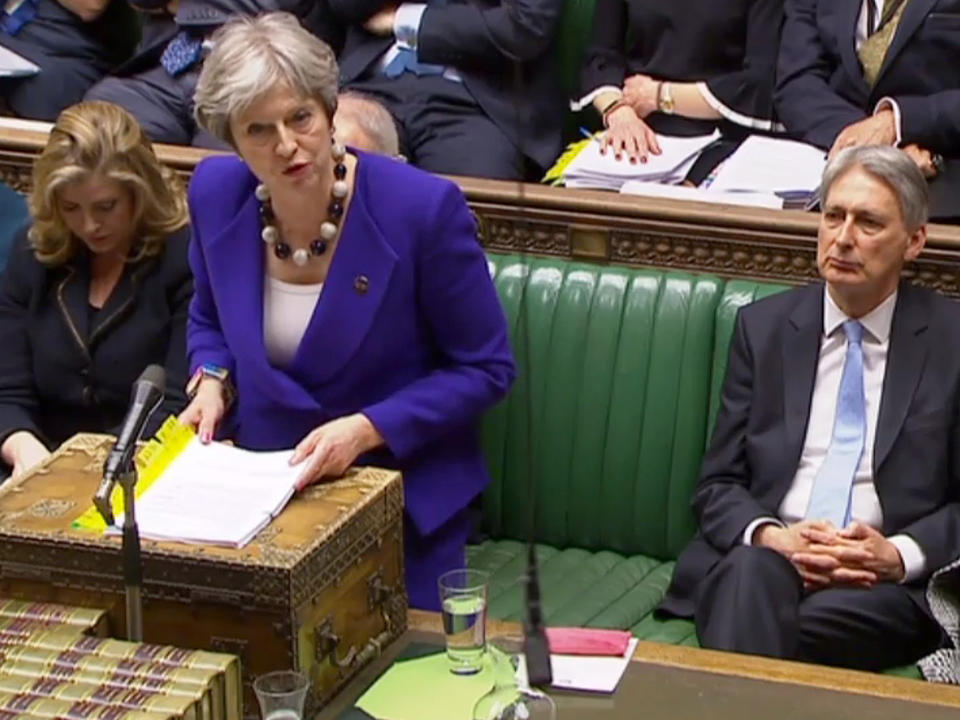The Windrush generation scandal has been damaging for Theresa May, but her home secretary may come out of it on top

The prime minister may have scored a nice debating point against the Labour leader yesterday, with her revelation that the decision to destroy the landing cards of the Windrush generation had been taken by a Labour home secretary; but she is lucky not to have had to surrender her job over this most astonishing of scandals.
First, Theresa May plainly did enact a “hostile environment” policy while at the Home Office, a regimen that has outlasted her and which has been adopted, perhaps less enthusiastically, by her successor, Amber Rudd. It was Ms May who linked driving licences, NHS treatment, access to benefits, jobs and much else to migration status, and she must take responsibility for the consequences, intended or unintended, that flow from that. We are still in a situation where the difficult circumstances of some migrants of various vintages leaves them unable to claim benefits, but also banned from taking a job. It is not just the Windrush generation which has suffered injustices and humiliations under the “hostile environment”. It is worth mentioning that, despite the harshness of the May regime, it has scarcely succeeded in meeting its objectives in any case.
The prime minister must also shoulder responsibility for presiding over a government that, unaccountably, simply ignored the cries of anguish from the Home Office’s victims and those who tried to speak up for them, including MPs, high commissioners and the leader of the opposition. When Jeremy Corbyn raised the issue at Prime Minister’s Questions on 14 March, albeit on a particularly egregious case of injustice, the alarm bells should have gone off. It was at that point that Ms May should have taken steps to find out what was going on. She failed to do so. Moreover, she must have been aware of the anguish her policy was causing to British citizens. If she was not, then her home secretary ought to have been, and, either way, they need to explain what they knew about this scandal, when they knew, and what, if anything, they did about it. It suggests that the plight of these people was a low priority for the government. If that is unfair, and the government has a positive case for its actions, then that case needs to be heard.
The prime minister was undoubtedly discourteous, at best, in initially refusing to meet Caribbean premiers in London for the Commonwealth Heads of Government meeting. They had a moral right to put forward the case on behalf of those who has been in touch with them because they were being threatened with deportation to these territories. Some, such as Jamaica, Barbados and St Lucia, retain the Queen as head of state, and it would not be surprising if the Palace hadn’t hinted to No 10 that the Queen of Jamaica, of Barbados, St Lucia and her other realms and possessions, was concerned about what was happening. Some smaller territories, such as Montserrat, the Cayman Islands and Anguilla are still British overseas territories, the union jack part of their flags. The UK has special responsibilities to these places as the last fragments of empire.
In any case it prompted a swift U-turn by the prime minister, and a generous apology to the assembled heads of government, though overshadowed by the coverage of the Syrian airstrikes. Indeed were it not for those distractions, the injustices meted out to the Windrush generation by her government would have been the main news story and inflicted much more damage on her.
Much of the commentary in recent days has settled on the position of Ms Rudd, who has described the attitude of the department she herself runs as “appalling”. She has been candid about the culture of the Home Office, and its failings as an organisation to show a human touch, a not-so-oblique snipe at her predecessor. In turn, the prime minister is said to be “furious” about the row. Tory MPs are said to be out to force Ms Rudd to quit. The Home Secretary’s well publicised scepticism about Brexit may lie behind some of this hostility. Yet the truth is that both Ms May and Ms Rudd, and indeed their Labour predecessors, must account for a department that is still, on the face of it, “not fit for purpose” in the famous phrase of John Reid, who served at the Home Department under Tony Blair in 2006 and 2007. Despite reforms and a period of stability since 2010, the department is still not in a state the public, who pay for it, would wish it to be.
And so the games continue, even as members of the Windrush generation and their friends and families watch, bemused by their treatment. Ministers imply officials are to blame; Labour politicians blames Conservative politicians; Conservative politicians repay the compliment. If anything, the one person who does emerge with some scraps of credit from this is Ms Rudd. Awakened at last to the scale and sheer cruelty of the maladministration, she has put measures in place to deal with cases swiftly and humanely. Out of this may emerge a kinder, gentler Home Office, if not a more efficient one. It would be nice to think that the department and the government's implacable attitude to Syrian refugees, for example, might soften as a result. The signs are though, that the Home Office’s supplies of empathy remain on short rations.

 Yahoo News
Yahoo News 